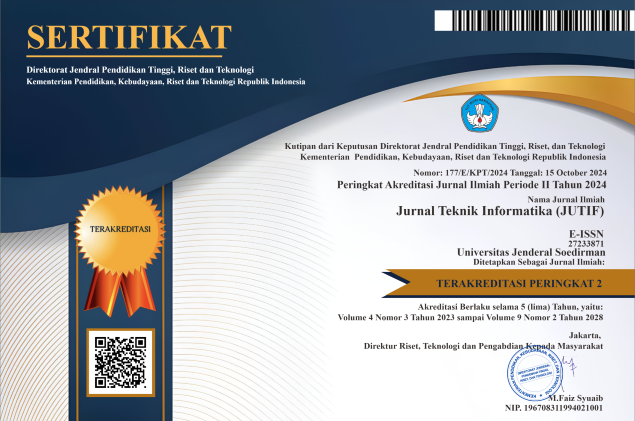PREDICTION OF THE ENGLISH PREMIER LEAGUE CHAMPION TEAM FOR THE 2021/2022 SEASON USING THE NAÏVE BAYES METHOD
DOI:
https://doi.org/10.20884/1.jutif.2022.3.5.328Keywords:
English Premier, League Champion, Naïve Bayes, Season, Team PredictionAbstract
The English Premier League is the top division league in England, the most popular football league for football fans. The competition date for the 2021/2022 season was announced on March 25, 2021 and the schedule was released on June 16, 2021. Manchester City won last season (2020/2021). The purpose of this study is to find out the results of Naive Bayes' accuracy in determining which team deserves to win in the English Premier League 2021/2022 season and which team does not deserve to win in the final standings. The method used for prediction is Naïve Bayes, which is to predict an opportunity in the future based on events in the past which is then called the Bayes theorem. Combined with Naïve's theorem, it can be said that a condition between attributes can be independent. Naïve Bayes is an arrangement of a system that calculates a collection of opportunities that are summed at a frequency and a combination of values from the existing data set. Based on the research conducted, it was generated from predictions to determine the winning team quickly and accurately and from the test results it was necessary to process training data and test data with the Naïve Bayes method, it was obtained an accuracy of 32.7% for the chances of Manchester City winning and Liverpool with 42.06% accuracy to be able to win the English Premier League season 2021/2022.
Downloads
References
M. Sabransyah, Y. N. Nasution, and F. D. T. Amijaya, “Aplikasi Metode Naive Bayes dalam Prediksi Risiko Penyakit Jantung,” J. EKSPONENSIAL, vol. 8, no. 2, pp. 111–118, 2017.
I. N. Farida, Y. S. Lestyaningtyas, and F. S. Clustering, “IMPLEMENTASI FUZZY CLUSTERING UNTUK,” vol. 1, no. 1, pp. 24–32, 1978.
A. F. Efendy, “Tingkat Stress Menjelang Perlombaan Terhadap Hasil Perlombaan Pada Atlet Atletik Kejuaraan Nasional Yunior Dan Remaja Jawa Tengah Di Jakarta Tahun 2013,” Univ. Negeri Semarang, pp. 1–23, 2013.
A. Saleh, “Implementasi Metode Klasifikasi Naïve Bayes Dalam Memprediksi Besarnya Penggunaan Listrik Rumah Tangga,” vol. 2, no. 3, pp. 207–217, 2015.
D. Untuk et al., “Penggunaan data mining dengan metode naïve bayessian classification untuk memprediksi juara liga inggris musim 2006/2007,” 2007.
M. A. Yaqin, M. Z. Ramadhan, A. F. Jauhari, and A. G. Humami, “Optimasi Pemilihan Posisi Terbaik Pemain Muda Pada Game Football Manager 2018 Dengan Metode Naïve Bayes,” pp. 59–65, 2019.
N. Sulardi and A. Witanti, “SISTEM PAKAR UNTUK DIAGNOSIS PENYAKIT ANEMIA MENGGUNAKAN,” vol. 1, no. 1, pp. 19–24, 2020.
T. I. Andini, W. Witanti, and F. Renaldi, “Prediksi Potensi Pemasaran Produk Baru dengan Metode Naïve Bayes Classifier dan Regresi Linear,” pp. 27–32, 2016.
M. F. Rifai, H. Jatnika, and B. Valentino, “Penerapan Algoritma Naïve Bayes Pada Sistem Prediksi Tingkat Kelulusan Peserta Sertifikasi Microsoft Office Specialist ( MOS ),” vol. 12, no. 2, pp. 131–144, 2019.
H. F. Putro, R. T. Vulandari, and W. L. Saptomo, “Penerapan Metode Naive Bayes Untuk Klasifikasi Pelanggan,” vol. 8, no. 2, 2020.
M. H. Rifqo, A. Wijaya, and J. Pseudocode, “IMPLEMENTASI ALGORITMA NAIVE BAYES DALAM PENENTUAN PEMBERIAN KREDIT,” vol. IV, no. September, pp. 120–128, 2017.
J. Teknologi, I. Dan, and K. Vol, “TEMATIK - Jurnal Teknologi Informasi Dan Komunikasi Vol. 8, No. 1 Juni 2021,” vol. 8, no. 1, pp. 96–103, 2021.
R. Wijayatun and Y. Sulistyo, “Prediksi Rating Film Menggunakan Metode Naïve Bayes,” vol. 8, no. 2, pp. 60–63, 2016.
T. Informatika, U. Malikussaleh, and A. Utara, “PENERAPAN ALGORITMA NAIVE BAYES,” vol. 8, no. 1, pp. 884–898, 2014.
D. Kurniawaty, S. K. Sari, I. Cholissodin, F. Ilmu, and K. Universitas, “IMPLEMENTASI METODE NAÏVE BAYES CLASSIFIER UNTUK SELEKSI,” vol. 3, no. 4, pp. 273–278, 2016.



























